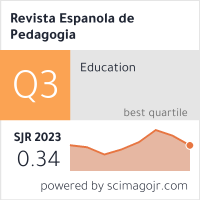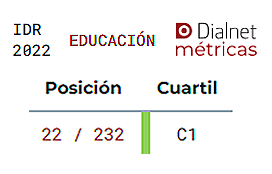Abstract
This article focuses on the theoretical justification for an indirect method for character education inspired by Aristotle. In the Nicomachean Ethics, Aristotle discusses a dianoethical virtue he calls synesis that can be developed without the need to expose learners to real moral situations that compromise them, as it is not a mandatory or imperative virtue like prudence, but merely a discriminatory one. Accordingly, the method we propose here is indirect as it does not try to increase ethical virtues by planning opportunities for moral action by the students, but rather by encouraging the development of their moral criteria, which for Aristotle is not a fixed rule of right actions but rather a habit developed in which the frameworks by which human affairs are judged are enriched thanks particularly to education based on morally meaningful stories and fables.
This is the English version of an article originally printed in Spanish in issue 274 of the revista española de pedagogía. For this reason, the abbreviation EV has been added to the page numbers. Please, cite this article as follows: Pérez Guerrero, J. (2019). Justificación de un método indirecto para la educación de la virtud inspirado en Aristóteles | An outline of an indirect method for education in virtue inspired by Aristotle. Revista Española de Pedagogía, 77 (274), 385-401. doi: 10.22550/REP77-3-2019-01
Referencias | References
Adorno, T. W. (1998). Educación para la emancipación. Madrid: Ediciones Morata S. L.
Annas, J. (2011). Intelligent virtue. Oxford: Oxford University Press.
Aristóteles (1985). Ética a Nicómaco. Madrid: Centro de Estudios Constitucionales.
Aristóteles (1999). Poética. Madrid: Gredos. Arthur, J. (2003). Education with Character. The Moral Economy of Schooling. Londres: Routledge Falmer.
Bárcena Orbe, F. (2012). Una pedagogía de la presencia. Crítica filosófica de la impostura pedagógica. Teoría de la Educación, 24 (2), 25-57.
Berkowitz, M. W. (2011). What works in values education. International Journal of Educational Research, 50 (3), 153-158.
Brighouse, H. (2006). On education. London: Routledge.
Buxarrais, M. R. (1999). Aproximación a la educación moral y reforma curricular. In M. Martínez & J. M. Puig (Coords.), La educación moral. Perspectivas de futuro y técnicas de trabajo. Barcelona: Graó.
Carr, D. (1999). Cross Questions and Crooked Answers: The Modern Problem of Moral Education. In J. M. Halstead & T. H. McLaughlin (Eds.), Education in Morality (pp. 24-43). London: Routledge.
Carr, D. (2005). On the contribution of literature and the arts to the educational cultivation of moral virtue, feeling and emotion. Journal of Moral Education, 34 (2), 137-151.
Carr, D. (2016). Virtue and knowledge. Philosophy, 91 (3), 375-390.
Carr, D., Arthur, J., & Kristjánsson, K. (Eds.) (2017). Varieties of virtue ethics. London: Palgrave Macmillan.
Carr, D., & Harrison, T. (2015). Educating Character Through Stories [Kindle version]. Retrieved from https://www.amazon.com/Educating-Character-Through-Stories-David-ebook/dp/B00S8B5MAQ
Carr, D., & Steutel, J. (Eds.) (1999). Virtue Ethics and Moral Education. London: Routledge.
Curren, R. (2010). Aristotle’s Educational Politics and the Aristotelian Renaissance in Philosophy of Education. Oxford Review of Education, 36 (5), 543-559.
Curren, R. (2013). A neo-Aristotelian account of education, justice, and the human good. Theory and Research in Education, 11 (3) 231-249.
Escámez, J., & Ortega, P. (2006). Los sentimientos en la educación moral. Teoría de la Educación, 18, 109-134.
Espinosa Zárate, Z. (2016). La educación moral en contextos informales. Teoría de la Educación, 28 (2), 53-73.
Fernández Herrero, B. (1991). El esquema de Kohlberg revisado: R. S. Peters y la educación moral temprana. Teoría de la Educación, 3, 127-148.
Fuentes, J. L. (2018). Educación del carácter en España: causa y evidencias de un débil desarrollo. Estudios sobre Educación, 35, 353-371.
Garrett, J. E. (1993). The Moral Status of ‘the Many’ in Aristotle. Journal of the History of Philosophy, 31 (2), 171-189.
Hartshorne, H., May, M., Maller, J. B., & Shut-tleworth, F. K. (1928). Studies on the nature of character (vol. 1). New York: Macmillan.
Isaacs, D. (2010) La educación de las virtudes humanas y su evaluación. Pamplona: EUNSA.
Isai, M. D. (2013). Phronesis between Ethics and Ontology. Philosophia. Studia Universitatis Babes-Bolyai, 58 (2), 69-84.
Isidori, E. (2015). Education as Synesis: A Hermeneutical Contribution to the Pedagogical Theory of Educational Practice. Social and Behavioral Sciences, 197, 531-536.
Kristjánsson, K. (2007). Aristotle, Emotion, and Education. Farnham: Ashgate.
Kristjánsson, K. (2010). The Self and its Emotions. Cambridge: Cambridge University Press.
Kristjánsson, K. (2015). Aristotelian Character Education. London: Routledge.
Kristjánsson, K. (2016). Flourishing as the aim of education: towards an extended, ‘enchanted’ Aristotelian account. Oxford Review of Education, 42 (6), 707-720.
Lewis, P. (2012). In defence of Aristotle on character: toward a synthesis of recent psychology, neuroscience and the thought of Michael Polanyi. Journal of Moral Education, 41 (2), 155-170.
Lickona, T., Schaps, E., & Lewis, C. (2003). CEP’s eleven principles of effective character education. Washington, DC: Character Education Partnership.
Long, C. P. (2002). The ontological reappropriation of phronesis. Continental Philosophy Review, 35 (1), 35-60.
MacIntyre, A. (1987). Tras la virtud. Barcelona: Crítica.
Martínez, M. (1999). Rol del educador y de la escuela en el ámbito de la educación moral. In M. Martínez & J. M. Puig (Coords.), La educación moral. Perspectivas de futuro y técnicas de trabajo. Barcelona: Graó.
Martínez Mares, S. (2017). Bases filosóficas para la educación moral a través de la compasión. In J. A. Ibáñez-Martín & J. L. Fuentes (Eds.), Educación y capacidades: hacia un nuevo enfoque del desarrollo humano (pp. 307-324). Madrid: Dykinson.
Mcdowell, J. (1997). Virtue and reason. In R. Crisp & M. Slote (Eds.), Virtue Ethics (pp.141-162). Oxford: Oxford University Press.
Noddings, N. (2009). La educación moral. Propuesta alternativa para la educación del carácter. Buenos Aires: Amorrortu.
Nussbaum, M. C. (2015). La fragilidad del bien. Fortuna y ética en la tragedia y la filosofía griega. Madrid: Machado Grupo de Distribución.
Ortega Ruiz, P. (2016). La ética de la compasión en la pedagogía de la alteridad. revista española de pedagogía, 74 (264), 243-264.
Platón (2000). Diálogos, II. Madrid: Gredos. Polo, L. (1996). Ética. Hacia una versión moderna de los temas clásicos. Madrid: Unión Editorial.
Polo, L. (2003). Antropología trascendental, Tomo II. La esencia de la persona humana. Pamplona: EUNSA.
Rice, S. (1996). Dewey’s conception of “virtue” and its implication for moral education. Educational Theory, 46 (3), 269-282.
Ryan, K. (2013). The failure of modern character education. revista española de pedagogía, 71 (254), 141-146.
Sanderse, W. (2015). An Aristotelian Model of Moral Development. Journal of Philosophy of Education, 49 (3), 382-398.
Seligman, M. E. P. (2011). Flourishing. A Visionary New Understanding of Happiness and Well-being. New York: Free Press.
Sherman, N. (1989). The Fabric of Character: Aristotle’s theory of virtue. Oxford: Oxford University Press.
Silverstein, A., & Trombetti, I. (2013). Aristotle’s Account of Moral Development. Journal of Theoretical and Philosophical Psychology, 33 (4), 233-252.
Tobin, B. (1989). An Aristotelian Theory of Moral Development. Journal of Philosophy of Education, 23 (2), 195-211.
Tomás de Aquino (1933). Scriptum super Sententiis Magistri Petri Lombardi. Paris: Sumptibus P. Lethielleux. Retrieved from http://capricorn.bc.edu/siepm/DOCUMENTS/AQUINAS/Aquinas%20Super%20libros%20Sententiarum%20v3%20(1933)%20ocr.pdf (Consulted on 2018-10-25).
Tomás de Aquino (1990). Suma de Teología III. Parte II-II (a). Madrid: Biblioteca de Autores Cristianos.
Tomás de Aquino (2000). Comentario a la Ética a Nicómaco de Aristóteles. Pamplona: EUNSA.
Vilar, J. (1999). Clarificación de valores. In M. Martínez & J. M. Puig (Coords.), La educación moral. Perspectivas de futuro y técnicas de trabajo. Barcelona: Graó.
Walker, D. I., Roberts, M. P., & Kristjánsson, K. (2015). Towards a new era of character education in theory and in practice. Educational Review, 67 (1), 79-96.
Zagal, H. (1999). Synesis, euphya y anchinoia. Algunas habilidades para el conocimiento del singular. Anuario Filosófico, 32 (1), 129-145.
Citación recomendada | Recommended citation
Guerrero, J. P.
(2019)
.
An outline of an indirect method for education in virtue inspired by Aristotle.
Revista Española de Pedagogía, 77(274).
https://www.revistadepedagogia.org/rep/vol77/iss274/15
Licencia Creative Commons | Creative Commons License
Esta obra está bajo una licencia internacional Creative Commons Atribución-NoComercial 4.0.
This work is licensed under a Creative Commons Attribution-NonCommercial 4.0 International License









